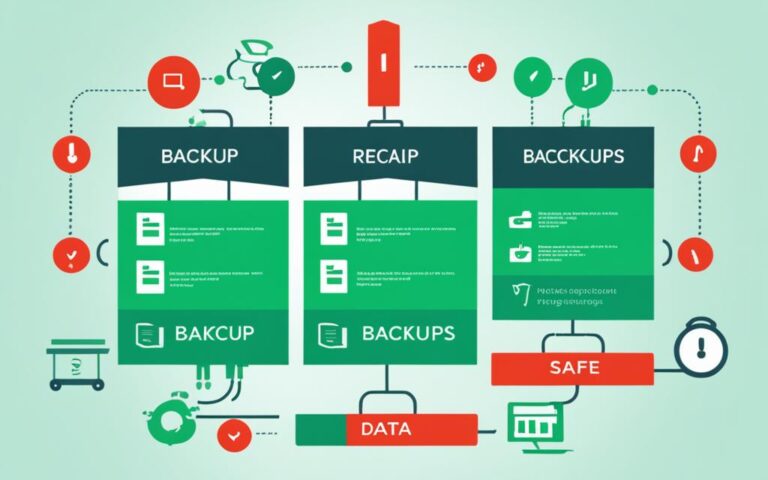The Legal Implications of Data Recovery
Data recovery is a critical process in today’s digital landscape. However, it is not without its legal implications. Organizations must navigate a complex web of privacy and data protection regulations to ensure compliance and avoid potential legal liabilities. Failure to do so can result in heavy fines and reputational damage.
When it comes to data recovery, one of the key regulations to consider is the General Data Protection Regulation (GDPR). This European Union law mandates that organizations have the ability to restore the availability and access to personal data in a timely manner. It also requires regular testing and assessment of data security measures to ensure compliance. Non-compliance with GDPR can have severe consequences, making it essential for organizations to prioritize data protection and recovery.
Alongside GDPR, there are other data protection regulations that organizations must adhere to. These regulations vary from country to country, but they all share a common goal – to protect individuals’ privacy and safeguard their data. Organizations need to assess their procedures for detecting and reporting data breaches, strengthen cybersecurity measures, and regularly test the effectiveness of backup and disaster recovery solutions.
In addition to internal compliance, organizations must also ensure that third-party providers are GDPR compliant and adhere to other data protection regulations. This is crucial as organizations often rely on these providers for data recovery services. By choosing GDPR compliant providers, organizations can mitigate the legal risks associated with data recovery.
Ultimately, data recovery plays a crucial role in business continuity and disaster recovery. It is not just about retrieving lost data; it is about ensuring legal compliance and protecting sensitive information. By prioritizing data recovery and complying with data protection regulations, organizations can safeguard their reputation, avoid legal liabilities, and ensure justice in legal proceedings.
Data recovery and digital forensics continue to evolve, shaping how organizations handle and protect data. As technology advances, emerging trends such as AI, blockchain, and IoT are set to further impact data recovery practices. Staying informed and adapting to these developments is crucial for organizations to stay ahead in the digital landscape.
In the following sections, we will delve deeper into the compliance requirements of GDPR and data protection regulations, the role of data recovery in business continuity and disaster recovery, and the significance of data recovery and digital forensics in legal proceedings. Stay tuned to learn more about these critical aspects of data recovery.
Compliance with GDPR and Data Protection Regulations
The General Data Protection Regulation (GDPR) is a comprehensive framework that mandates strict compliance with data protection regulations. Organizations must prioritize the restoration of availability and access to personal data in a timely manner, while also ensuring the ongoing effectiveness of their technical and organizational measures for data security.
Under GDPR, failure to comply with data protection regulations can result in severe consequences, including substantial fines and legal liabilities. To avoid these risks, organizations need to ensure that their backup and disaster recovery solutions align with GDPR requirements.
Choosing GDPR-compliant data recovery solutions is crucial, as it guarantees that personal data is handled and protected in accordance with the regulation’s guidelines. Organizations should also verify that their chosen data recovery providers adhere to the same strict data handling and protection rules.
Regular testing and assessment of data recovery measures are essential to ensure compliance with GDPR and data protection regulations. These evaluations should encompass both the technical aspects (such as the robustness of backup systems) and organizational procedures (such as data breach reporting and response protocols).
Organizations must ensure that individuals’ data is secure and protected throughout the data recovery process
To illustrate the importance of compliance with GDPR and data protection regulations, consider the following:
| Consequences of Non-Compliance | Importance of Compliance |
|---|---|
| Fines of up to €20 million or 4% of global annual turnover | Protects individuals’ privacy rights |
| Legal liabilities and reputational damage | Maintains trust and fosters customer loyalty |
| Loss of business opportunities and partnerships | Ensures ethical and responsible data handling |
Overall, compliance with GDPR and data protection regulations is a critical aspect of data recovery. It not only safeguards personal data but also helps organizations avoid legal risks and maintain their reputation as responsible data custodians.
Data Recovery in Business Continuity and Disaster Recovery
Data recovery is a critical component in ensuring business continuity and disaster recovery. Organizations must prioritize compliance with data recovery laws and regulations to safeguard themselves from legal liabilities and reputational damage. By implementing measures such as duplicate data centers and redundant infrastructure, businesses can ensure the availability of data in the event of system failures or natural disasters.
One key consideration in data recovery is complying with requests to delete personal data as mandated by regulations like GDPR. Organizations must have robust cybersecurity measures in place, including data protection technologies and regular testing of backup and disaster recovery solutions.
The importance of data recovery in business continuity and disaster recovery cannot be overstated. It enables organizations to bounce back from disruptions swiftly and minimize the impact on their operations.
The Role of Data Recovery in Business Continuity
Business continuity refers to an organization’s ability to continue operating seamlessly during and after disruptive events. In this context, data recovery ensures that critical data necessary for business operations is restored quickly and effectively.
By investing in reliable data recovery solutions, organizations can minimize downtime and maintain the flow of business activities. This allows them to meet their commitments to customers, partners, and suppliers, thereby safeguarding their brand reputation.
Data recovery also plays a crucial role in maintaining customer trust. Organizations that can quickly recover from data loss incidents demonstrate their commitment to protecting customer information and minimizing the inconvenience caused by any disruption.
Data Recovery’s Contribution to Disaster Recovery
Disaster recovery encompasses the processes and strategies used to recover and restore mission-critical systems and data in the aftermath of a catastrophic event. Data recovery is a key element of comprehensive disaster recovery plans.
In a disaster recovery scenario, organizations rely on the ability to recover data from backups to resume normal operations. This involves restoring data to its previous state, ensuring data integrity, and minimizing the impact on business processes.
Deploying duplicate data centers and redundant infrastructure ensures that data is accessible even if one location is affected by a disaster. This redundancy helps mitigate the risk of permanent data loss and enables organizations to continue serving their customers promptly.
Furthermore, data recovery allows organizations to retrieve critical information necessary for legal and regulatory compliance even after a disaster event. It ensures that organizations can meet their obligations and avoid potential penalties or legal consequences.
To summarize, data recovery plays an integral role in business continuity and disaster recovery. By adhering to data recovery laws and regulations, implementing redundant infrastructure, and prioritizing cybersecurity, organizations can mitigate the impact of disruptions, protect sensitive data, and ensure uninterrupted operations.
Data Recovery and Digital Forensics in Legal Proceedings
Data recovery and digital forensics play a crucial role in legal proceedings, offering valuable insights into behaviors and actions through the retrieval and analysis of digital data. In the era of technology, data has become a key source of evidence, with the potential to shape the outcome of legal cases. The ability to recover lost or deleted data is essential to avoid hindering legal proceedings and ensure the accuracy of judgments.
Digital forensics, in particular, is instrumental in criminal investigations, civil disputes, and maintaining legal compliance. By employing forensic techniques, experts can gather, examine, and present digital evidence in a legally sound manner. This involves adhering to strict methodologies and standards to preserve the integrity of the data throughout the entire process.
Challenges in data recovery for digital forensics include technical complexities, legal and ethical considerations, and the proper handling of recovered data. Technological advancements and encryption methods pose obstacles to retrieving data from devices, necessitating the expertise of forensic specialists. Moreover, legal and ethical considerations regarding privacy and data protection must be scrupulously observed to ensure compliance with relevant regulations.
Overall, data recovery and digital forensics provide crucial support in legal proceedings, enabling the discovery of evidence, unraveling complex cases, and upholding justice. The continuous evolution of technology and data storage systems necessitates ongoing innovation and adaptation in the field of digital forensics to meet the demands of modern legal processes.
“The importance of data recovery and digital forensics in legal proceedings cannot be overstated. These practices enable us to uncover valuable evidence and ensure fair and just outcomes.” – Emma Thompson, Digital Forensic Expert
Benefits of Data Recovery and Digital Forensics in Legal Proceedings
1. Accurate Evidence: Data recovery and digital forensics provide a reliable source of evidence that can be crucial in establishing facts and uncovering the truth.
2. Timeliness: Swift data recovery and forensic analysis expedite legal proceedings, reducing delays and ensuring efficient case management.
3. Comprehensive Insight: The examination of digital data offers a comprehensive understanding of events, motivations, and patterns, aiding in the formulation of persuasive arguments.
4. Forensic Expertise: Specialized knowledge and skills in data recovery and digital forensics can offer unique perspectives and assist legal professionals in building compelling cases.
Incorporating data recovery and digital forensics into legal proceedings enhances the quality of evidence, facilitates efficiency, and promotes fairness in the pursuit of justice.
Prominent Use Cases
Data recovery and digital forensics have been instrumental in various high-profile legal proceedings, aiding in the resolution of complex cases. Some notable use cases include:
| Case | Data Recovery/Digital Forensics Application |
|---|---|
| Corporate Fraud Investigation | Recovering deleted emails and financial records to uncover fraudulent activities |
| Cybercrime Prosecution | Analyzing log files, network traffic, and digital communication to trace the origin of cyberattacks |
| Family Law Dispute | Forensic analysis of social media, emails, and messaging apps to establish evidence of misconduct or hidden assets |
These examples illustrate the diverse applications and critical role of data recovery and digital forensics in supporting legal proceedings across various domains.
Conclusion
Data recovery has significant implications for legal compliance and the protection of sensitive information. Organizations must prioritize compliance with data protection regulations, particularly the General Data Protection Regulation (GDPR). By integrating data recovery with digital forensics, organizations can address the complexities of digital evidence in legal proceedings.
The future of data recovery and digital forensics is being shaped by emerging technologies such as artificial intelligence (AI), blockchain, and the Internet of Things (IoT). It is crucial for digital forensic companies to stay abreast of these developments in order to deliver cutting-edge services and ensure legal compliance.
In conclusion, data recovery and digital forensics play a critical role in upholding legal compliance, protecting sensitive data, and ensuring justice in legal proceedings. As technology continues to advance, organizations must continue to prioritize these practices to navigate the evolving landscape of data protection and digital evidence.












